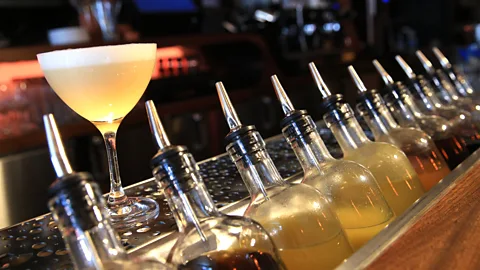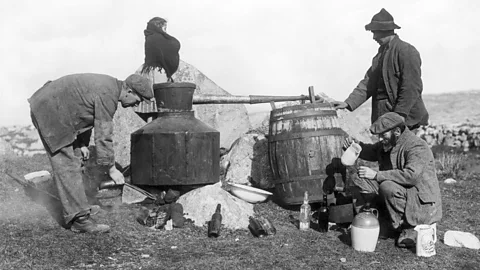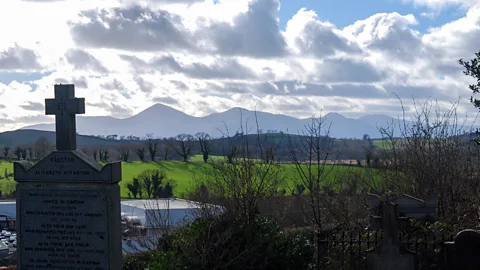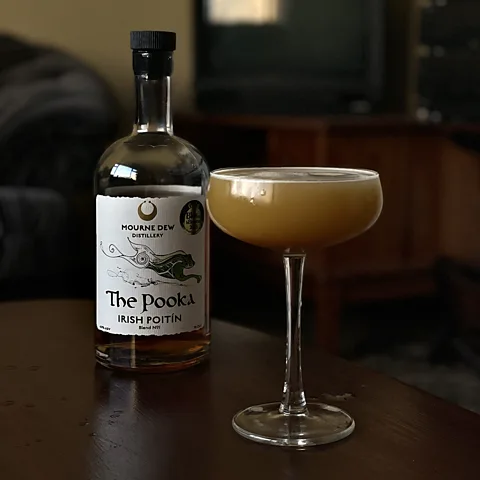The super-strength Irish 'moonshine' making waves
 Rene Johnston/Getty Images
Rene Johnston/Getty ImagesA once-bootlegged spirit, poitín has become a symbol of Irish determination, encapsulating heritage and identity – especially on St Patrick's Day.
"I got fed up being a barrister, so I thought I'd give distillery a go instead," said Donal Farrell, describing the birth of his Mourne Dew Distillery in 2017, which is located near the banks of Northern Ireland's Carlingford Lough and huddled in the shadow of the majestic Mourne Mountains. Farrell's Mourne Dew is one of several new companies elevating poitín practices that have been proudly maintained by both Irish and Northern Irish families since the 6th Century.
Poitín translates as "small pot" in Irish and is pronounced as "pot-cheen". The super-strength spirit gets its name from the copper pots where it was traditionally distilled as a homemade Irish moonshine – an illicit category of alcohol associated with bootlegging. Ironically, the spirit was first created in convents and monasteries some 1,500 years ago.
Throughout the 16th and 17th Centuries, almost every sizeable farm had its own personal distillery, and by 1661, poitín became so endemic that it was deemed illegal by the British Crown in an attempt to control its untaxable spread. It wouldn't be re-legalised until 1997, but despite the legislation, people have continued to secretly distil poitín in hidden stills to avoid taxation. The drink is now a symbol of Irish culture and determination, and when celebrating St Patrick's Day, perhaps no other drink better encapsulates Ireland's heritage and identity than this ancient spirit.
 Mirrorpix/Getty Images
Mirrorpix/Getty ImagesYou can make poitín from anything fermentable that is naturally grown in Ireland, but the best-quality poitín is typically grain-based rather than potato, like many spirits. It can legally be sold as up to 90% pure alcohol, although Farrell's highest poitín is 60%. "It's like rocket fuel but really, really nice," he said. The spirit is a chameleon in the sense that its flavour takes on the body of its fermentation, distillation and mixing process. In its purest form, it has a light grainy taste and slight sweetness.
Farrell is part of a new generation of distillers, creating modern ideas and techniques while preserving the historical distillation process. For instance, he uses vacuum distillation, which distils alcohol at a low temperature to increase the purity of the final product.
Despite the modern approaches to making poitín, distillers are committed to honouring its conventual or monastic heritage.
"The convents were the universities of their time," Farrell said. "They were the ones who had funds for research". As early as the 6th Century, Irish clergy conducted experiments that led them to believe that distilled liquids were the true spirit of the original product, and poitín was born from malted barley. It remained a beverage of the Christian establishment until Henry VIII's relations with Pope Clement VII broke down completely in 1534, after which many nuns and monks – without their churches – relied on poitín distilling and teaching as a financial crutch. As a result, knowledge of poitín spread throughout the masses.
The religious undertones behind poitín are so great that some brands even nod to nuns and monks in their names, like Smuggling Nun. From across the pond in New England, Irish American founder Maura Clare solidified her love for poitín when one of her cousins, a Franciscan nun, brought it to her in the state of Connecticut some 40 years ago. In 2020, with the pandemic pausing work, Clare went full steam ahead, founding one of the few female-owned poitín brands. Clare partnered with Copeland Distillery in County Down, the eastern region of Northern Ireland's six counties. This step was crucial to achieve the certification, as poitín has Geographical Indicative Status, meaning it can only be classed as authentic poitín when distilled in Ireland or Northern Ireland.
 Eibhlis Gale-Coleman
Eibhlis Gale-Coleman"Smuggling Nun was named after my cousin, who smuggled the poitín to me… back when it was still illegal. But the brand name and the Gothic arch label also point to the role clergy had in the creation of beverage alcohol," Clare explained. By portraying a strong female figurehead, Clare highlights the role of women in poitín making.
"Current books about that history often refer to the influence of monks only, with women having been written out of the story," she said. "In truth, nuns and other women were integral in the development of brewing and distilling." Incidentally, St Brigid (celebrated on 1 February) is the patron saint of brewing, while her alleged close friend, St Patrick, is the patron saint of Ireland and celebrated on 17 March.
The true beauty of poitín is how individuals put their own spin on the drink. As it has ed through generations, it has always been stamped with individuality, be it Farrell's vacuum distillation or Clare's inspiration from Sister Mary and highlighting the role of nuns.
More like this:
- The tiny Italian town that drinks like ancient Rome and Greece
Poitín has been a closely guarded secret among the Irish for centuries. However, the tide is turning, with new distillers like Mourne Dew and the Smuggling Nun opening across Ireland and Northern Ireland and offering their bottles worldwide. In fact, the drink is fast becoming set for St Patrick's Day dominance, as a much more traditional and potent beverage for celebrations.
"Poitín is poised to become the next new thing on the cocktail scene," Clare said. "It's imminently mixable, with a strength and flavour that is a standout in mixed drinks". As distillers gradually begin to share family recipes and the true 'spirit' of this original Irish moonshine, poitín is becoming a drink for the masses.
 Mourne Dew Distillery
Mourne Dew DistilleryThe Pooka's Wild Ride: Donal's Speciality Poitín Cocktail recipe
By Donal Farrell
Makes 1 drink
Ingredients
1 tsp dark brown sugar
50ml Pooka poitín from Mourne Dew or other poitín
15ml raw root ginger juice
15ml lime juice
100ml alcoholic ginger beer
a splash of angostura bitters
orange slices, for garnish
Method
Dissolve the sugar in the poitín, ginger juice and lime juice, then add the ginger beer and a splash of bitters with an optional cube or two of ice. Pour into a glass and serve garnished with a slice of orange.
BBC.com's World's Table "smashes the kitchen ceiling" by changing the way the world thinks about food, through the past, present and future.
--
